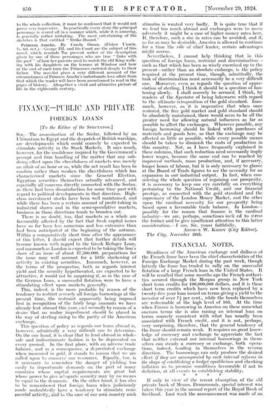FINANCE-PUBLIC AND PRIVATE
FOREIGN LOANS
[To the Editor of the SPECTATOR.] Si a,—The assassination of the Sirdar, followed by an Ultimatum to Egypt and the despatch of British warships, are developments which could scarcely be expected to. stimulate activity in the Stock Markets. It says much, however, for the confidence inspired by the Government's prompt and firm handling of the matter that any sub- duing effect upon the cheerfulness of markets was merely an affair of an hour or so, while the net result has been to confirm rather than weaken the cheerfulness which has characterized markets since the General Election. Egyptian securities themselves actually advanced, and especially all concerns directly connected with the Sudan, as there had been dissatisfaction for some time past with regard to political developments in that direction. High- class investment stocks have been well maintained, and while there has been a certain amount of profit-taking in industrial shares and in the semi-speculative markets, business in those directions tends to broaden out.
There is no doubt, too, that markets as a whole are favourably affected by the fact that fresh capital issues have so far been less numerous and less extensive than had been anticipated at the beginning of the autumn. Within a comparatively short time after the appearance of this letter, I should expect that further details will become known with regard to the Greek Refugee Loan, and inasmuch as London is expected to be taking the lion's share of an issue of about £7,500,000, preparations for the issue may well account for a little slackening of activity in existing securities. Inasmuch, however, as the terms of the prospectus, both as regards interest yield and the security hypothecated, are expected to be attractive, it would not be surprising if, as in the case of the German Loan, a successful flotation were to have a stimulating effect upon markets generally.
This, indeed, is the more probable by reason of the tendency to restrict severely all foreign borrowings at the present time, the restraint apparently being imposed first in recognition of the fairly- large amounts we have already lent abroad this year, and secondly by reason of a desire that no undue impediment should be placed in the way of sterling rising to the parity of the American exchange. This question of policy as regards our loans abroad is, however, admittedly a very difficult one to determine. On the one hand, it-is clear that to lend abroad in whole- sale and indiscriminate fashion is to be deprecated on every ground. In the first place, with an adverse trade balance, and as a consequence, a depreciated exchange when measured in gold, it stands to reason that we are called upon to conserve our resources. Equally, too, is it necessary to remember the danger of yielding too easily to importunate demands on the part of many countries whose capital requirements are great but whose power to give adequate security may by no means be equal to the demands. On the other hand, it has also to be remembered that foreign loans when judiciously . made undoubtedly have a tendency to stimulate corn. - merdal tNa case. of our oWii Country. such stimulus is wanted very badly. It is quite true that if we lend too much abroad and exchanges were to move adversely it might be a case of higher money rates here. If, therefore, such a rise in rates can be avoided, and if, as far as may be desirable, America is allowed to continue for a time the role of chief lender, certain advantages might accrue.
Nevertheless, I cannot help thinking that in this question of foreign loans, restraint and discrimination—. such as that which has been so wisely exercised up to the present—rather than an absolute embargo, is the policy required at the present time, though, admittedly, the task of discrimination must necessarily be a very difficult one. Moreover, even as regards the question of appre- ciation of sterling, I think it should be a question of has- tening slowly. I shall scarcely be accused, I think, by readers of the Spectator of being lukewarm with regard to the ultimate reimposition of the gold standard. Inas- much, however, as it is imperative that when once restored, the free gold market and gold standard should be absolutely maintained, there would seem to be all the greater need for allowing natural influences as far as possible to affect the exchanges. Wherever possible, any foreign borrowing should be linked with purchases of materials and goods here, so that the exchange may be affected as little as possible, while every possible means should be taken to diminish the costs of production in this country. Not, as I have frequently explained in these columns, that such reduction need necessarily imply lower wages, because the same end can be reached by improved methods, mass production, and, if necessary, longer hours of labour, but it is only necessary to glance at the Board of Trade figures to see the necessity for an expansion in our industrial output. In fact, when con- sidering the whole question of regaining our prosperity, it is necessary to keep one eye carefully on everything pertaining to the National Credit, and our financial prestige, as connected with the gold standard and the supremacy of the London Money Market, and the other upon the cardinal necessity for our prosperity being based upon a favourable trade balance. In London— possibly for the reason that finance is the cardinal industry—we are, perhaps, sometimes inch. cd to stress the former and to give insufficient attention to this latter consideration.—I am, Sir, yours faithfully,


























































 Previous page
Previous page